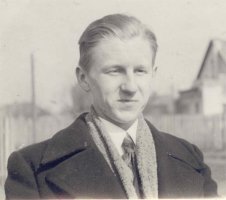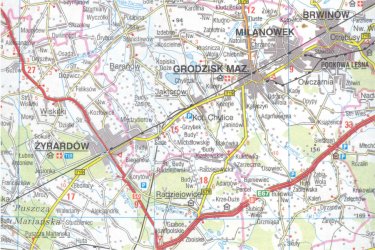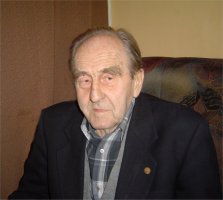The insurgent accounts of witness
Jan Romanczyk "Łata" (= a patch) - the boy from "Miotła" (= a broom)
The action near Jaktorow
 |
Jan Romanczyk
born on the 1st of May 1924 in Wolomin
sergeant cadet of Home Army
pseud. "Łukasz Łata" (= Lucas the Patch)
Kedyw of the Main Headquarters of Home Army
"Torpeda" (= a torpedo) Platoon, "Miotła" (= a broom) Battalion
"Radoslav" Grouping
|
In April 1944 "Miotła" carried out near Jaktorow an action of blowing up a military train transporting military supplies for the German army in the east. Near that little estate, located between Grodzisk and Zyrardow, there was going a railway track, on which the supply was carried to the German army fighting heavy battles on the east front.
The railway traffic on the route was enormous. Day and night there were passing loaded freight cars, tanks and platforms. The East Front devoured thousand tonnes of supply. To protect the railway tracks Germans allowed enormous forces. Trains were escorted, along the tracks armed patrol were walking systematically, the stations were guarded by powerful guards.
Those groups were responsible for the reconnaissance of the railway traffic on the route and they drew up assumptions for carrying out successful sabotage and mine-laying actions. One of the chosen places was a fragment of tracks between Jaktorow and Nieborow, about 1km from Jaktorow stop, 36 kilometres from Warsaw.

The place of action
In the first days of April 1944 from the commanding officer of "Miotła" Cpt. "Niebora" Franciszek Mazurkiewicz there came an order of blowing up a German military transport on an earlier chosen, as a result of reconnaissance, fragment of tracks near Jaktorow. Lieutenant "Kulesza" Witold Przyborowski was appointed to be the commanding officer of the action. The group consisted of 10 people from a combat group of Kazimierz Jackowski "Hawelan," later "Torpeda" and from "Sarmak" unit.
From "Hawelan" group there were:
"Hawelan" Kazimierz Jackowski - the commanding officer of the unit
"Henryk Łatka" Tadeusz Bartosiewicz
"Andrzej Babinicz" Adam Hubert Domin
"Boruta" Stanisław Tytus Domin
"Stefan Boncza" Jerzy Gniewkowski
"Adam Horski" Zenon Jackowski
"Dwernicki" Tadeusz Poznanski
"Łukasz Łata" Jan Romanczyk
"Stanisław Kwiatkowski" Roman Staniewski
"Kubryn" Józef Wysocki
From "Sarmak" unit in the action took part the following:
"Jerzy Pradzynski" Jerzy Cieślak
"Ziemborak" Romuald Swiatek.
The participants of the action on the 6th of April 1944 at 18:00 reached the train platform in Ursus. There divided into small groups they were waiting for the train to Zyrardow. Some of the soldiers were heavily laden with things, as they had to take earlier prepared mines, wires, fuses, and guns (machine guns and grenades). Waiting for the train was dragging on for an eternity. The train, that had already arrived, was so crowded that the commanding officer decided to wait for another train. Travelling in the crowd of a large group of armed people posed too serious a hazard.
Finally the next train, around 22:00 took the group of "Miotlarze" (= broom-men) and it reached Jaktorow and in quite an unexpected company. As it turned out, Germans used the same train for delivering the patrols of railway guard along the railway tracks. At the train stop Jaktorow, apart from boys there got off 20 Germans armed with rifles and light machine guns (rkm). The same group of Germans moved further. Fortunately the guards didn't notice anything suspicious and when they stood in pairs they marched along the track in the direction of Grodzisk.
"Kulesza" group rescued from the unwanted company marched along the road in the direction of Miedzyborow. The aim was a tiny meadow 300 metres away from the track. On the tiny meadow- there took place the last briefing before the action.
Two groups were to be the guard for the main group that task was to lay a mine and let off the explosive charge. The guard from the side of Warsaw was led by "Łata." The group consisted of: "Kubryn," "Ziemborak," and "Pradzynski."
A difficult moment of laying mines had come. In a total darkness there were dug out little holes under the interior track leading in the direction of Warsaw. The place was chosen in such a way that after the track having been damaged the derailed train would block both tracks running here in the pit. It was to lengthen, in a considerable way, the time of repairing the damages as the railway crane would have a restrained access.
It had been planned to plant three explosive charges in rather small intervals from one another, in total about 10kg of "plastic." It was an explosive charge not very powerful - a 100gramme explosive charge was enough to cut the track. As it had turned out during earlier actions, the cutting of the track itself wasn't enough to derail the train. In this situation redoubled explosive charges were used. The charges had been prepared earlier before the action. It was however necessary to put them under the track, join with fuses, put the igniters and wires.
To protect oneself from a potential attack of partisans Germans ran on the tracks interchangeably slow trains with Polish passengers and military freight trains. In express trains two first carriages were intended for Poles and then the rest of them to Germans. What was more the steam engines were usually operated by Polish engine drivers.
Taking into account all of that when the mine actions were taking place the mines with an automatic fuse weren't used. They would burst under the steam engine or under the first carriage, what would result in life losses among Poles. During sabotage actions in such a situation, the manually let-off mines were used. Slow trains were allowed through, when freight trains the mine was let off behind the steam (for the Polish railwaymen) when express trains under the third passenger carriage.
The commanding officer of the group, mine-laying experts and the guard went on their positions. There was a complete darkness and a gentle wind was blowing. In a complete quietness, trying not to tap with stones on the tracks, mine-laying people put the mines, the work went smooth and fast under the leadership of the commanding officer. It was necessary to hurry up, as any time the train would arrive. The fuses were fixed while electric cables and the line from the pull fuse was delivered to the fire position. The commanding officer paid special attention to the correct arrangement of the cables, that had to run under the track so as to prevent them from being cut by the train wheels.
Finally everything was ready. The commanding officer chose a place for the location of a tiny station letting off explosive charges. Both the central group and the guard groups withdrew a little bit from the track. "Boruta" got detached from the central group coming out as an observer a little bit further in the direction of Zyrardow.
The most tiring and irritating period of waiting took place. The midnight passed by. There had already been Good Friday, the 7th of April 1944. There was a dampness off the ground, it was chilly, the north wind was blowing. Soldiers were waiting in an absolute silence. Nobody could smoke.
Two electric trains passed by. There appeared a gentle anxiety in the group whether the quakes caused by the travelling carriages wouldn't bring an incidental explosion. Fortunately nothing like that happened. A considerable emotion would have been experienced by few passengers of the trains if they had known that under the rushing carriages there was located a deadly explosive charge.
It was 0.15 .One could hear a heavy clatter of an approaching train. Silence. It appeared that the smoke from the steam engine obscured the view of the observer's signal. The observation post was to be taken a little bit further from the track.
It was 0.30. Again one could hear the approaching train. This time the observer decided to allow it through. The carriages contained ironed straw and folded barracks. It was highly improbable that there could be something moveable in other carriages as the material was inflammable. The transport was not worth the mines.
One moment later the steps reverberated from Miedzyborow side. A German patrol was coming whose task was to guard the tracks. The danger was serious as Germans were going along the track under which mines had been laid. It was true they were camouflaged but above the pit there were hanging electric cables and the fuse cord.
In a deep silence Germans passed the watchman and the guard group, approached the central group, the mine and the cables. Maybe it was a patrol that had arrived earlier together with "Miotlarze" (= broom-men) to Jaktorow. The situation became dramatic.
If the patrol had arrived earlier when the mines were being laid, the guard had to have an uneven fight. But the situation was different then. Every louder stir, the clang of the safety catch, a shot would have been a mistake. Lieutenant "Kulesza" held in hand the ignition cable and was waiting.
In their slow marching Germans had to approach the mine. If they had noticed it and wanted to defuse it they would have had to stop for a moment. One couldn't expect that the patrol of the railway guard would go along the mined track, cross the cord and cables and go further showing no interest.
Lieutenant "Kulesza" decided to let the patrol approach the same mine and then to let off the charge. The explosion of 10kg of "plastic" should inflict serious loss on Germans and then there would be time for using machine guns and grenades.
In that moment something unexpected happened. Almost at the very last minute, some metres before the mine, the patrol turned, went on the other track side and wandered further in the direction of Jaktorow, accompanied from just a few-metre distance with the barrels of the guard group from Warsaw side. A coincidence? And maybe the voice of reason?
One should remember that in that time a single German and even whole patrols, more and more frequently, demonstrated indifference towards, sometimes obvious, actions of the enemy, when the clash with the armed opponent could be spared in that way. One could feel the undermined morale of Germans being aware of the approaching war end, and the end not necessarily beneficial to them.
01.47 was coming near. A moment ago the steps of twenty guardians of the Great Reich, who hadn't managed to reach Jaktorow station yet, died down. It was high time the action had been completed. A heavy noise of the oncoming train is heard. A red torch has flashed. Corporal "Hawelan" shouted:" Fire!" Lieutenant "Kulesza" joined the cables of the tiny ignition while "Boncza" pulled the cord of the fuse.
Clung to the ground the members of the group saw a great flash and heard a long-drawn-out sound of explosion. For a moment nothing happened the train was still moving along. Though after a while the steam engine turned, the grinding and clatter of the piling up carriages reverberated. One could hear the boom of explosions and the sound of falling stones.
The action plan didn't include either rummaging about in the carriages or raking the transport. In this regard the group instantly wandered off from the tracks along the fields in the southern direction. Just for a moment one could hear a swoosh of steam coming from the damaged boiler of the engine. Now the German patrol shouldn't have any doubts about this that had happened. The explosion boom was heard within some-kilometre radius.
Though the reason and caution didn't abandon brave representatives of Herrenvolk and the group of "Kulesza" wasn't chased by anybody. Just twenty minutes later above the place of the action flares were seen. "Miotlarze"(= broom-men) had been far away then.
It cleared up, the moon lit the vicinity. The group gave from the south of Jaktorow and Grodzisk a wide berth. In front there were going two people on the guard, and then the rest in a line. After a ten-kilometre marching soldiers from "Miotła" tired with the strenuous march, rested in the nearby grove. Some of them had chafed feet in the packed Germans shoes alloted by "Miotła" command. To quench the thirst they were eating snow that still survived in that place.
Coming to Warsaw wasn't less dangerous than the action itself. There was a high probability that Germans realized that the attack had been carried out by a group from Warsaw. In that situation there was a certainty that roads to the city and railway tracks could be surrounded. One shouldn't attract attention. Descending a large group of people on one of the little stations near Warsaw wasn't considered too.
Fortunately for the time being the roads and fields were completely empty. The only person met on the road was a woman carrying milk for sale. Some litres of milk were bought from her. The sales-woman was more surprised than frightened with the unexpected meeting.
About three at dawn the Imroths' manor house Kazimierowka "was conquered and garrisoned." That manor house was often used as a launching pad for various actions of "Miotła" on that area. In spite of the German name the owners were Poles and patriots, while visits of the underground movement soldiers were greeted warmly by them heedless of any danger. Only because of the strangers the "attack" was faked.
The visit of the group at the Imroths' lasted a few hours, spent on dinner and tidying up the clothes. Fortunately everyone was safe and sound. Only Lieutenant "Kulesza" received a blow on the back with a stone that had been thrown into the air by the explosion. At dawn members of the action in small groups, went, one by one, to the EKD (= Warsaw Commuter Railway) stop where without any problems they reached Michalowice. Then the group got divided.
The same day there was made a reconnaissance of the action place. The train with ammunition, going to the east front, had an "extra stopover" lasting 14 hours. A substantial damage was suffered by the carriage with 25 armed guards and three cars with ammunition. Fourteen carriages got derailed. The steam engine blocked the neighbouring track. Its Polish crew came out of the accident unscathed.
All participants of the action near Jaktorow took part in another, numerous battle actions of "Miotła" in the pre-Uprising period. All of them fought in the Warsaw Uprising, while eight of them were killed.
Jan Romańczyk

|
Jan Romanczyk
born on the 1st of May 1924 in Wolomin
sergeant cadet of Home Army
pseud. "Łukasz Łata"
Kedyw of the Main Headquarters of Home Army
"Torpeda" Platoon,
"Miotła" Battalion
"Radoslaw" Grouping
|
elaboration: Maciej Janaszek-Seydlitz
translation: Małgorzata Szyszkowska
Copyright © 2011 Maciej Janaszek-Seydlitz. All rights reserved.


